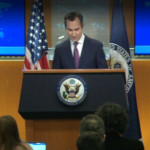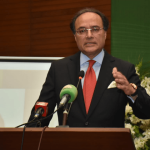This should be a day of celebration for women, but the reality of the war between Israel and Hamas clouds the celebration of International Women's Day. Since October 7, more than 30,000 people have died in the Gaza conflict, forcing around 1.9 million Palestinians to flee their homes. About 70% of the victims are women, children, and infants, who are disproportionately affected by the violence.
In recent appeals to the International Court of Justice (ICJ), South Africa drew attention to acts of reproductive injury, a crucial but frequently disregarded component of Israel's transgressions.By implementing "measures intended to prevent births within the group with the intent to destroy, in whole or in part, a national, ethnical, racial, or religious group," Israel was allegedly in violation of Article 2(d) of the Genocide Convention, according to these petitions. In the midst of coordinated bombs and the ensuing humanitarian catastrophes, the fight for reproductive rights is extremely important since it denies women their fundamental rights and affects future generations.
While it is the duty of all states to work toward peace in Gaza, feminist foreign policy countries bear a special responsibility to defend women's rights. Protecting sexual and reproductive health and rights should be the top priority in a feminist approach to foreign policy (SRHR).
The Violation of Reproductive Rights: New Lives Under Threat
The current conflict in Gaza is not just an unsettling reality for the women and families there; it is also a violation of their most basic human rights, including the ability to procreate. Approximately 52,000 Palestinian women were reportedly expecting when the fighting started in October of last year. Due to the destruction of more than half of Gaza's hospitals and the inadequate operation of the ones that remain, women are giving birth in filthy, crammed shelters without access to adequate medical care. Every ten minutes, a baby is born in these terrible conditions as the conflict rages on, raising the already high rates of maternal and newborn death in the area.
Numerous rights groups draw attention to the worsening health conditions and the elevated mortality risks for expectant mothers and their babies. Because of the humanitarian situation, women are frequently released from the hospital three hours after giving birth, hygienic medical equipment is in short supply, and emergency C-sections are performed without anesthesia. Newborns in incubators are becoming more and more vulnerable as power shortages compel hospitals to rely on quickly running out generator fuel. The situation is getting worse due to severe shortages of commodities such as blood, clean water, medicines, and other necessities.
Pregnant women are particularly affected by the psychological effects of the hostilities, which include an increase in stillbirths, early births, and miscarriages. Premature birth, malnourishment, and dehydration in unborn children have been linked to maternal stress resulting from firsthand exposure to military violence. According to statistics, the number of miscarriages has increased by 300 percent as a result of Israeli attacks.
Beyond the health of mothers, the shortage of menstrual hygiene products and the illnesses that result when women and girls use filthy clothing or fabric during their periods also negatively impact women's health.Furthermore, sexual assault—which the UN refers to as "the most ancient, least discussed, and seldom condemned crime of warfare"—is becoming more commonplace among women. Likewise, a recent inquiry determined that there were "reasonable grounds" to suspect that Hamas had sexually assaulted women during its assault on Israel.
The likelihood of women falling prey to sexual assault and rape is increased by the disintegration of social standards, escalating hostilities, and forced relocation. Many of these victims thus face the additional difficulty of unintended pregnancy. Human rights and international law are violated by sexual violence in conflict areas, which has catastrophic long-term impacts on victims and communities and hinders post-conflict healing and reconciliation.
Accountability in the wake of a crisis
Policy discussions must address a wide range of rights breaches, including reproductive violence, while the international community works through diplomatic solutions and humanitarian initiatives. It is especially the duty of feminist foreign policy-abiding governments to consider women's health while making decisions.
Feminist foreign policy does, in fact, particularly seek to promote women's rights and gender equality, with a focus on sexual and reproductive rights. They give a tactical framework for incorporating women's rights into public policy and providing targeted assistance in places impacted by war; this is a strategy that has been adopted by nations including Canada, Chile, France, Germany, Mexico, the Netherlands, and Spain.
For example, in order to improve women's and girls' access to healthcare, Canada's feminist overseas assistance policy places a high priority on SRHR. This covers the provision of HIV/AIDS treatment, safe abortion, comprehensive sexuality education, and contraception. In keeping with feminist ideals, the Canadian government committed $700 million to SRHR initiatives in 2019. Similar to this, France prioritizes SRHR in its feminist diplomacy, pushing for universal access to sexual and reproductive health rights in order to empower women. Adolescent SRHR, contraception, and campaigns against child, forced, and early marriages are priority issues.
The fundamental component of any democratic society is granting and defending equal rights for all. When there is a commitment to gender equality and the active participation of women and other marginalized groups, not only as participants but also as benefactors of democratic development, then inclusive and accountable democratic institutions and processes can be achieved.
- 23 Dec, 2024
Suggested:

Abagail Leannon
Alice indignantly, and she went on, 'and most of 'em do.' 'I don't think they play at all like the.
Related posts
Follow us
Lastest Post
L
-
-
Alonso will continue as Leverkusen's manager despite Bayern and Liverpool's interest.
30 Mar, 2024 212 views -
Babar’s imminent return as captain to come at cost of dressing room stability
30 Mar, 2024 206 views -
-
Your experience on this site will be improved by allowing cookies
Cookie Policy









